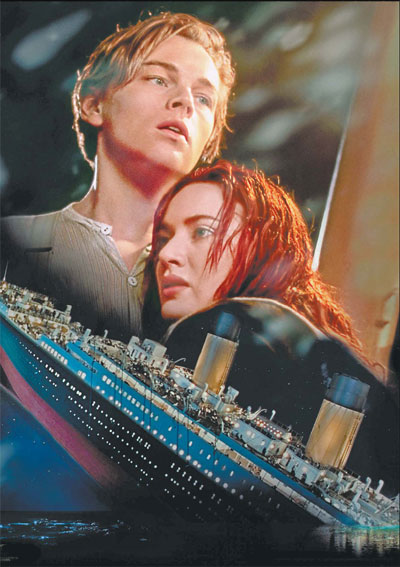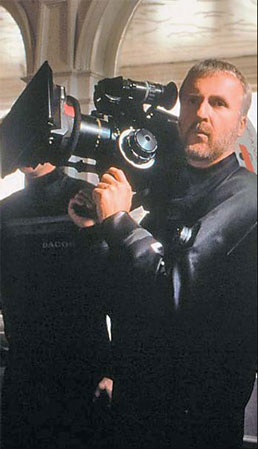


Related: Sailing on rough waters
On the eve of Titanic's 3D release in China, Liu Wei talks to a cross-section of viewers, theater managers and industry insiders in Beijing to find out why Jack and Rose's love story still endures.
The tagline used in the advert for the film Titanic, screened for the first time in Chinese theaters in 1998, remains an eternal favorite with industry insider Ben Ji.
During a business trip in Wuhan, Hubei province, the veteran distributor saw a board outside a theater that said: "Titanic, recommended by President Jiang Zemin."
Ji, working for a Hollywood studio's Beijing office at that time, was surprised.
"Rarely ever had China's top leader recommended a film, especially a Hollywood one," he says.
In March that year, Jiang, then president of China, talked about the film in a political meeting with delegates from Guangdong province. He said the film had, incisively and vividly, depicted the relations between money and love, poor and rich, and how different groups of people dealt with a crisis. He even suggested other political leaders go see it.
Newspapers in Guangdong picked up the story, followed by other media across the country.
Zhao Jun, general manager of Zhujiang Films Group, was in charge of publicity at Guangdong Film Corporation in 1998. He made multiple copies of the newspaper that reported Jiang's speech and faxed it to many theater managers across the country.
Geng Yuejin, now deputy general manager of Edko Films Beijing, was working in a theater in Fujian province. He received a copy of the press report, which inspired him to persuade organizations and government departments to buy group tickets for their employees.
"Many government officials, including governors and mayors, went to see the movie," he says.
 |
|
Director James Cameron works on Titanic. Photos provided to China Daily |
The combination of endorsement by the country's top leader, the glory of 11 Academy Awards, the press frenzy, and the theater managers' efforts turned the film into a huge hit in China. Audiences, men and women, young and old, rushed to theaters.
Huang Xing, a 33-year consulting firm owner, grew up in Zhuzhou, Hunan province. He remembers watching the film at least twice. His parents worked in factories, and almost every factory in the city gave their employees tickets of Titanic as a bonus.
College student Si Si was just 11. She went to watch the film with her classmates. While she did not quite understand the love story, she cried with everyone else in the only theater in Changchun, capital of Jilin province, after the ship collided with the iceberg. She says she will definitely watch the film's 3D and 3D IMAX versions, released in China on Tuesday, to refresh her memory.
The film finally raked in 360 million yuan ($55 million) in China, more than 25 percent of the box office grossing of the whole year. It was the highest-grossing picture in the country until Transformers 2 broke the record by earning 450 million yuan ($71) in 2009.
Geng was not surprised by the revenue. Before the film hit theaters in April 1998, he attended a preview for theater managers across the country hosted by China Film Group, the only company that imported foreign films for theatrical release in the Chinese mainland. The film was quite long, but he found none of the viewers went out during the three-hour duration. When it ended, long queues formed outside the toilet.
"I knew at that moment the film would be a hit," he says.
The Titanic phenomenon spread across the country.
Images of Jack and Rose were printed on poker cards and T-shirts. Their flying pose on the ship inspired TV commercials. Zhao Wei, one of the most popular stars in the late 1990s, had a lyric on her album: "My dream boyfriend? Leonardo."
And Celine Dion suddenly became a household name, thanks to the theme song My Heart Will Go On.
"Actually it was quite difficult not to listen to the song, because it was played everywhere," recalls 30-year accountant Marjorie Ma. "It was the first English song I heard in its entirety."
Hu Qiming, then China chief representative of UCI, a joint venture of Paramount and Universal, recalls he gave 10 CDs of the film's soundtrack to Zhao Shi, then chief of the State Administration of Radio, Film and TV, as gifts when she visited the United States. Soon he was told that the CDs were so popular among her friends that she had none left for herself.
The film's impact on Chinese audiences and filmmakers is profound, insiders believe.
"By watching Titanic, for the first time, many Chinese audiences got an idea of what a real Hollywood blockbuster was like, in terms of box office, reputation, how powerful it could be in visual and audio effects and how wide an audience it could reach," Ben Ji says.
Geng Yuejin of Edko Films thinks that the film epitomizes the concept of a global film.
"Chinese filmmakers marvel at the fact that a film can actually win over global audiences. Male and female, poor and rich, white and black, are all able to appreciate the story," he says. "With a precise catch of universal emotions, a film has a global market."
The film also shows how technology can add dimensions to a regular genre such as romance. Chinese media and scholars were motivated by the film's popularity to study how director James Cameron's imagination took shape on the big screen assisted by his diligent exploration of technology, which, Hu Qiming believes, was something valuable.
"In Titanic it is easy to see how powerful a film can be when the storytelling is combined with cutting-edge technology," he says.
"And it is definitely not a bad thing for filmmakers to learn that this seamless combination comes from the passion and courage to dive deep into the sea as many as 12 times to get a better sense of the ship's wreck and achieve perfect underwater cinematography."